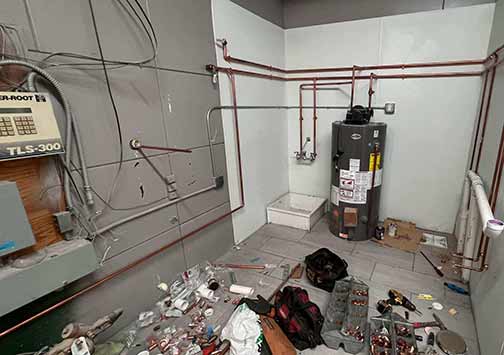
Water heaters in commercial settings provide hot water for a variety of applications. They are often at the very heart of the day-to-day operations of the businesses that rely on them. That’s why when a commercial water heater fails, JTS Management experts note that it can result in massive disruptions and huge losses for a business.
Commercial water heaters are different from residential water heaters in many respects. Unlike home water heater systems, commercial systems allow for consistent running usage. During operation, they can support up to 1,000,000 BTUs and get exponentially hotter than residential systems.
Consequently, the impact of malfunctions in commercial water heater systems can be disastrous. Apart from their effect on your business operations and finances, problems in your hot water system can pose serious safety issues for your staff.
A commercial water heater’s ability to hurt your business and endanger the lives of the people who work for you is why you should take malfunctions in the system seriously. Thankfully, problems in a commercial water heater system rarely happen without first showing some signs.
What are the typical signs when the commercial water heater in your business premises is about to fail?
5 signs that your Commercial water heater is about to fail
Leakage and moisture
Leaks in commercial water heater systems usually come from the tank, connecting pipes or faulty valves. These problems, if not dealt with quickly, will result in moisture issues that can damage your building and nearby equipment. If the leak is caused by faulty components or loose connections, it should be fairly easy to fix. However, if the water heater tank is damaged, the only solution may be to replace it.
Insufficient hot water
There are three reasons why a commercial water heater will not produce enough hot water: sediment buildup within the tank, a malfunctioning thermostat and a damaged heating element. Problems with the heating element are often due to wear, a blown fuse or tripped circuit breaker. If the problem is caused by sediment, flushing the tank should solve it. Most times, you can solve thermostat issues by simply adjusting the settings.
Irregular water temperature
Significant variations in the water temperature, even when thermostat settings have not changed, maybe a sign that your thermostat needs replacement. It could also be due to a damaged dip tube or heating element. If adjusting or replacing the thermostat does not fix the problem, you may need a professional to help you get to the root of the problem.
Rusty/discolored water and strange odors
The most common reason a commercial water heater produces rusty or discolored water is corrosion inside the tank. Corrosion within the water heater tank is either caused by aging or sediment buildup. If the problem is caused by sediment, flushing the tank will get rid of it. However, if the problem is due to aging, the only solution is to replace the water heater tank.
Strange noises
Unusual sounds from your commercial water heater, such as banging and gurgling, indicate excessive mineral buildup inside the tank. They may also result from a malfunctioning heating element or loose pipe connections. If tightening all the loose connections and flushing the tank does not solve the problem, please have a professional inspect the water heater.

An experienced commercial plumber is your best ally for ensuring the longevity of your commercial water heater.
How to prevent problems in your commercial water heater
Understanding the above signs will help you avert impending water heater failure. But you can take this further by implementing steps to prevent these problems altogether. That is possible when you create a plan for routine maintenance of your commercial water heater.
Routine maintenance of your commercial water heater is the best way to ensure the smooth and safe operation of the system. This method will save you money by helping you to detect problems in their early stages. What are the steps for doing routine maintenance on a commercial water heater?
Inspect valves and connections
Valves, fittings and connections are common sites for leaks and corrosion. Checking these components on a schedule is essential.
Periodic tank flushing
You cannot stop sediment and debris from building up inside the tank. However, flushing the tank on a schedule ensures that these processes do not escalate into major problems.
Check pressure relief valve
This valve is the most essential safety feature on your commercial water heater. Checking the valve regularly will eliminate or at least diminish the risk of water heater tank explosions.
Get professional help
Only a qualified plumber should do the above steps. An experienced commercial plumber is your best ally for ensuring the longevity of your commercial water heater.
Finally, in addition to routine maintenance, how your staff treat your commercial water heater matters. To prolong the system’s lifespan, employees must understand the proper usage of the water heater. Also, don’t forget that your employees are in the best position to detect and report minor problems in your commercial water heater before they become big issues.